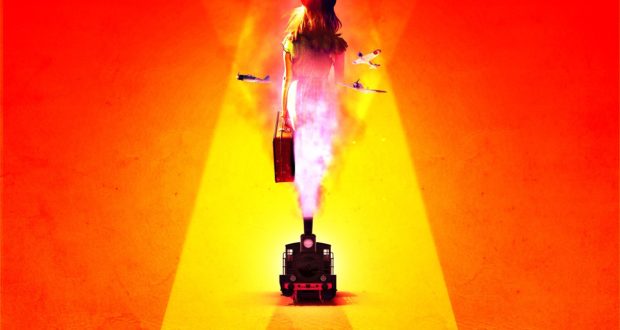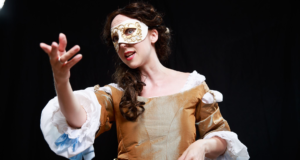This March, Queen’s Theatre Hornchurch and Les Théâtres de la Ville de Luxembourg will mark the 80th anniversary of the World War II-era train that brought Jewish children to safety in the UK with a new production of Diane Samuels’ Kindertransport. Before the play kicks off its London run, we caught up with director Anne Simon to learn more about the female-driven production and how its message is now timelier than ever.
It’s the second day of rehearsals for Kindertransport. The plan was to re-read the play, says director Anne Simon, but three hours later they haven’t started. ‘We’re having really interesting discussions,’ she explains. ‘There are so many layers, there’s so much to be talked about and so many options.’
Kindertransport tells the story of nine-year-old Eva, who was sent by her mother on a train from Nazi-occupied Germany to the safety of England shortly before the outbreak of World War II. Raised by foster mother Lil in Manchester, Eva changes her name to Evelyn and erases her past. When finally reunited with her birth mother, Evelyn is unable to forgive her for their separation.
A collaboration between Queen’s Theatre Hornchurch and Les Théâtres de la Ville de Luxembourg, the production is a timely one. It’s 25 years since Diane Samuels wrote the play, and 80 years since the first Kindertransport (children’s transport) brought 200 children to Great Britain. By the time war was declared, around 10,000 unaccompanied children had arrived in the UK and been sent to foster homes, hostels, farms or schools. Most of them never saw their families again.
Diane Samuels, in the author’s guide to the play, writes that Kindertransport ‘looks beyond the specifics of this historical event and taps into a universal human experience: that of a child’s separation from its mother’.
‘It’s really a play about identity,’ says Simon, ‘about being sent away somewhere and building a new life and how hard it is to arrive. That relates a lot to what is happening today: You have so many refugee kids fleeing wars in their country . . . where do they belong?’
That morning, the cast and creative team discussed ‘what it means to be different’ and ‘what losing or giving up your legacy means,’ says Simon. They also talked about the attraction of extremist groups, ‘because they do give that sense of belonging’, she adds.
The characters in Kindertransport face tough decisions. ‘The mother sends the kid away to protect her,’ explains Simon, ‘the child says, “Mum, why did you send me away, I would have preferred to stay with you and die with you”.’
‘It’s about decisions that are taken at that moment that we need to live with,’ continues Simon, ‘about decisions that you take in order to survive.’
Eva chooses to erase her past, ‘not because she wants to, but in order to be able to live,’ says Simon, who has been thinking about ‘how memory works’ and the internal conflict of ‘what memories do I keep, what memories do I forget?’
‘It’s not an easy play’ she admits, ‘but I think there’s also hope.’
Simon believes these in-depth discussions to be crucial and ‘what really will give the flesh and blood to those characters and to those situations’. In her experience, audiences ‘can feel if there was a discussion in the rehearsal room where those links to current affairs were made, or not’.
Originally from Luxembourg, Simon now directs internationally, mainly in English and German. This production brings together ‘a really mixed team and cast’ from Luxembourg and the UK, the direcor explains, adding that there was ‘a strong wish’ for ‘a real co-production’ between Les Théâtres de la Ville de Luxembourg and Queen’s Theatre Hornchurch, who worked together previously on The Crucible. There was also ‘a political motivation’ for the collaboration, adds Simon; ‘especially after the Brexit vote, this was something that became very urgent in a way’.
The play was chosen by Queen’s Theatre’s Artistic Director Douglas Rintoul for its pan-European theme and local significance. ‘The Kindertransport came through Harwich to London Liverpool Street, with many children being rehomed in Essex,’ says Rintoul, ‘so it’s a rich and important piece of history that is relevant to our audience’s heritage.’
Simon describes Kindertransport as a ‘brilliant choice’ and believes it will resonate with contemporary audiences. ‘We’re trying to relate it to everybody’s personal story, but also to what’s going on in the world right now, without having to be completely blatant about it,’ she explains. Citing the Brexit vote, Trump’s rise to power and Austria’s newly instated coalition government, which includes the far-right Freedom Party, Simon says: ‘Politically, something has happened that I think makes the play a bit more urgent than just a few years back.’
The play is set in an attic room in the 1980s, with Evelyn’s own daughter, Faith, preparing to leave home. The confined space represents Evelyn’s psyche, where memories of the past collide with the present. As Evelyn and Faith sort through boxes of belongings, the secrets of Evelyn’s past are revealed. The staging will reflect the psychological journey of the characters, Simon explains: ‘It’s about uncovering and discovering, so that’s really what the stage tries to do as well; it becomes barer and barer as we go along.’
Male characters in Kindertransport are conspicuous by their absence. Neither Eva’s father nor Lil and Evelyn’s husbands appear in the play, although they are mentioned. The masculine presence comes largely from the Ratcatcher, a symbolic and fictional character from Eva’s childhood storybook.
‘It’s for once a very female play, which is so rare,’ says Simon. Asked whether she thinks this will affect the handling or experience of the production, she replies: ‘It hasn’t so far but I think it certainly will.’ Simon laughs as she describes another project involving fourteen male actors and one female: ‘That was fun, very fun rehearsals but a bit more wrestling.’ Although only on day two, she’s finding ‘a bit less power struggle for attention at the table right now, which is actually quite nice.’
Anne heads back in to the rehearsal room to continue the debates and discussions that will shape this production of Kindertransport. It may be another few hours before the first read-through.
Kindertransport will play at Queen’s Theatre Hornchurch from 8-24 March.
 Everything Theatre Reviews, interviews and news for theatre lovers, London and beyond
Everything Theatre Reviews, interviews and news for theatre lovers, London and beyond



